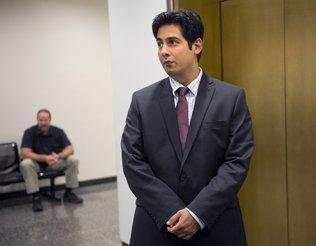Ojeda, Priest Accused in Molestation, Takes Stand
By Andy Furillo
Speaking publicly for the first time since his arrest in 2011 on suspicion of child molestation, the Rev. Uriel Ojeda testified Monday that he thought it would all be kept confidential when he spoke to church officials and a private investigator about the misconduct accusations that had been lodged against him. Ojeda testified in a Sacramento Superior Court hearing to determine if prosecutors can use in trial the statements he allegedly made to the secretary for Bishop Jaime Soto and a private investigator for the law firm that represents the Catholic Diocese of Sacramento. "It never crossed my mind," Ojeda, 33, testified when asked if his comments to the Rev. Tim Nondorf, formerly on Soto's administrative staff, and Joseph Sheehan, the investigator for the law firm of Sweeney & Greene, might be turned over to police. Defense attorney Jesse Ortiz wants the statements excluded on grounds they were a confidential clergy-penitent communication under the state Evidence Code. No details emerged in court Monday on exactly what Ojeda said to the two men when they went to Redding on Nov. 30, 2011, to bring him back to Sacramento to face the molestation charges. Deputy District Attorney Allison Dunham, in a previous court hearing, said they contained admissions by Ojeda that he sexually molested a girl who was under 14 years old. He has since been charged in a seven-count complaint on accusations that date back to June 2007, when he worked at Holy Rosary Catholic Church in Woodland and continued through August 2009 at Our Lady of Mercy Parish in Redding. In her cross-examination, the prosecutor revealed the existence of a text message the girl's father sent to Ojeda three weeks before Nondorf and Sheehan drove to Redding to have the priest removed from his ministry. "You have betrayed us," the text message said, according to Dunham's reading of it in her questioning of Ojeda. "You have betrayed our friendship and relationship. We found out what you did to our daughter." Ojeda testified that he read and understood the text message, but did not respond to the girl's father. "I didn't think text messaging back was the appropriate way to respond to it," he said. Wearing a gray suit with a burgundy tie and his hair slicked back, Ojeda spoke quietly in handling questions from Ortiz and Dunham. He remained firm, however, in asserting that he expected confidentiality when Nondorf and Sheehan carried a letter from the bishop saying the priest's ministerial faculties were being withdrawn as a result of the molestation accusation. Ojeda said he felt compelled under his "duty of obedience" to answer questions from Nondorf and Sheehan. "In my understanding, I am bound to answer whatever they inquire about," Ojeda testified, adding later, "I understand the conversation to be confidential." He admitted he knew his meeting did not amount to a confession in the context of the Catholic sacrament of reconciliation. Still, Ojeda testified, he didn't think they would turn his statement over to Sacramento police. "Because of my vow of obedience, and they didn't clarify to me their role, I was left to assume (the conversation) was confidential," he testified. Ojeda directly contradicted Sheehan's testimony from last week that he identified himself as a representative of the law firm that represents the diocese. Ojeda on Monday testified that Sheehan said "he was employed by the diocese" itself. The distinction could be critical in determining under the Evidence Code if the accused priest had a true expectation of confidentiality when he made the alleged incriminating admissions, in that a third, non-clerical person was in the room along with him and Nondorf. Both Nondorf and Sheehan reported to Sacramento police investigators what they said Ojeda told them. Although he claimed confidentiality, Ojeda said he knew that as a priest, Nondorf was a "mandated reporter" who, if he became aware of any admissions of child molestation, was required by law to pass them on to a police agency. Also Monday, a Nevada lawyer whose practice in large part consists of representing priests accused of sexual misconduct, testified as an expert witness on Ojeda's behalf. The attorney, Robert J.B. Flummerfelt, said Ojeda had an absolute requirement to talk to Nondorf and Sheehan, and a similar expectation of confidentiality. Flummerfelt said that in the hierarchy of the church, Ojeda "had been trained from the get-go" to obey, respect and defer to the bishop and his representatives, "from the moment of ordination." "You do what the bishop wants and expects," he testified. The fact Nondorf and Sheehan did not tape-record the conversation established "a heightened sense this is a confidential communication," he added. And the visitors' failure to tell Ojeda he had a right to a canonical, civil or criminal lawyer "says to me" that they were saying, "We're going to keep it between us," Flummerfelt testified. Flummerfelt became combative at times when he tried to deflect the DA's questions about Sheehan's role during the Ojeda interview. Flummerfelt insisted Sheehan acted as a representative of Bishop Soto. When Dunham asked him if he was aware of Sheehan's testimony that the bishop didn't tell him what to ask Ojeda, the witness responded, "His actions would indicate otherwise. He was there on behalf of the bishop." Dunham pressed Flummerfelt when he testified that "it's completely false" that Nondorf acted in an administrative capacity when he met with Ojeda rather than as part of his own spiritual ministry. "That's your opinion, right?" Dunham asked. "No," Flummerfelt replied. "It's the truth." The hearing is expected to continue today with the DA's expert witness on canonical law. On Wednesday, Judge Eugene L. Balonon is expected to rule on whether Ojeda's statements can be admitted at trial. Jury selection is scheduled to begin July 16. Contact: afurillo@sacbee.com
|
.
Any original material on these pages is copyright © BishopAccountability.org 2004. Reproduce freely with attribution.
